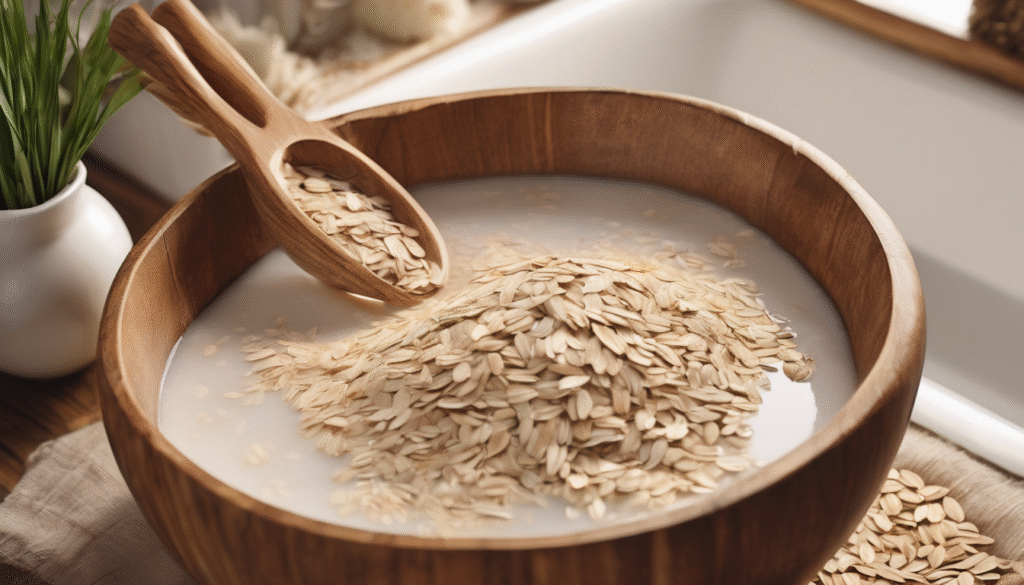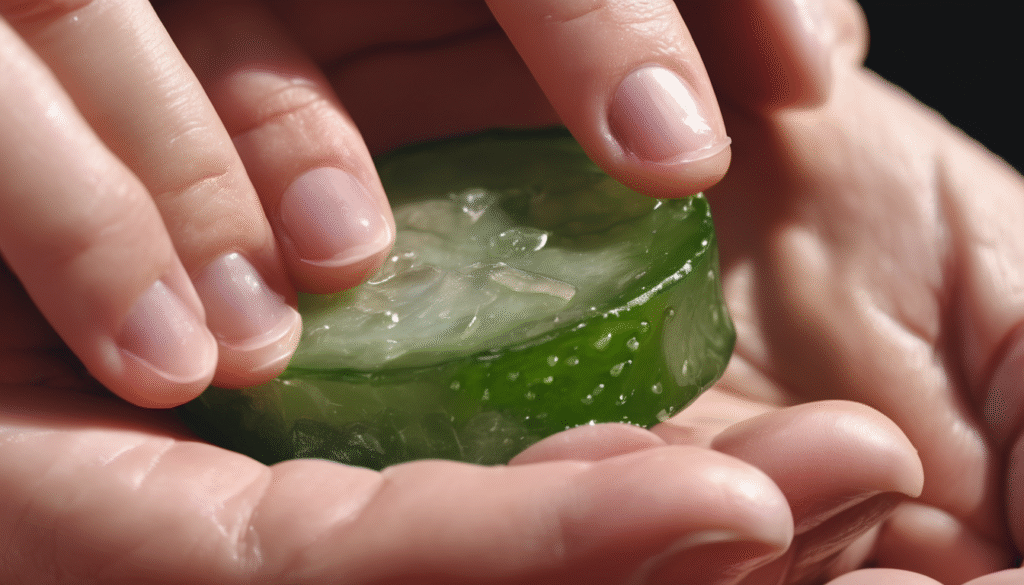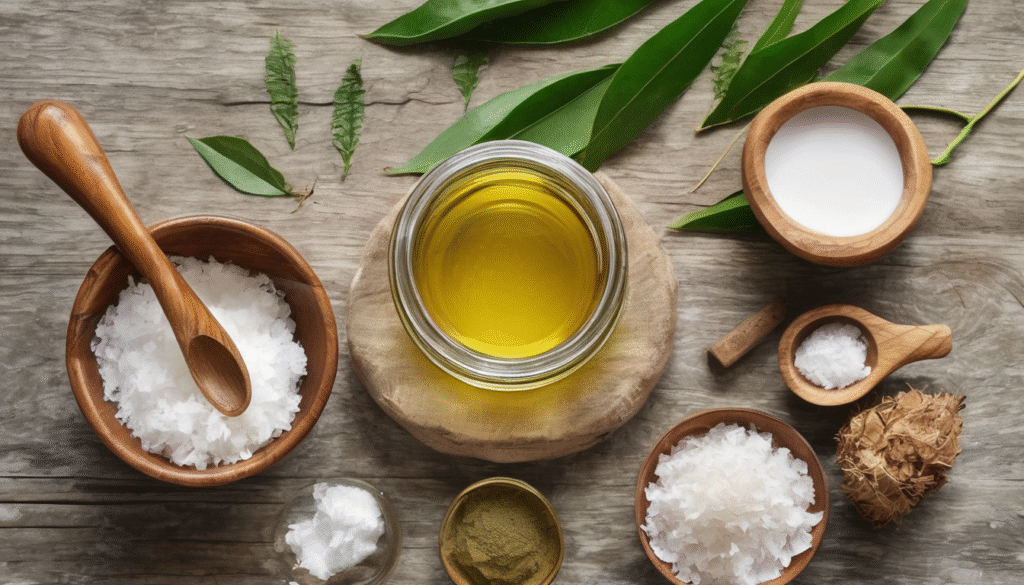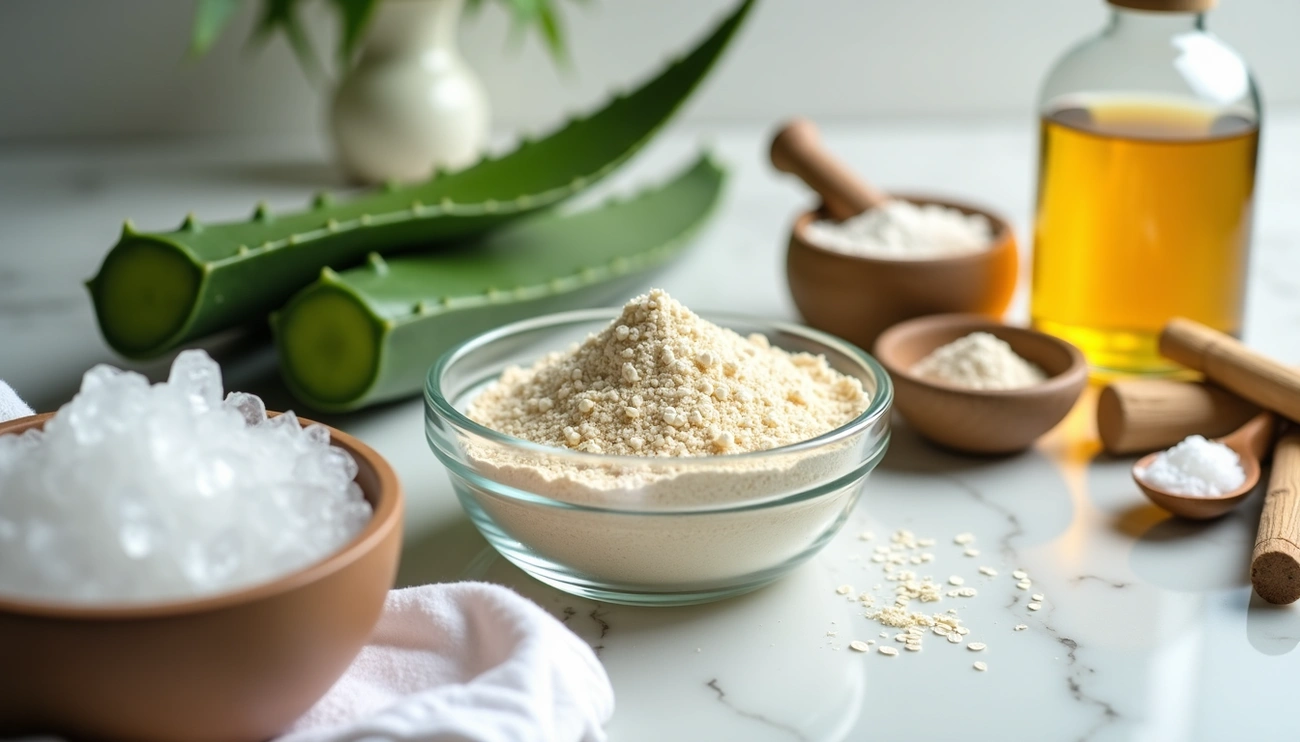Home remedies can provide relief from skin allergies that cause itchy, red, or blistered skin. These conditions affect men and women equally.
Skin allergies show up as several uncomfortable symptoms. People experience itching, redness in lighter skin, purple or brown discoloration in darker skin, swelling, and raised bumps.
These irritating symptoms typically resolve within one to two weeks, with or without treatment. The wait for natural healing can feel endless when you can’t stop scratching.
Your kitchen probably has powerful ingredients that can soothe irritated skin. Simple solutions like cooling oatmeal baths with anti-inflammatory properties and baking soda applications help balance skin pH.
You won’t need to visit the pharmacy. Natural remedies, such as essential oils (lavender, peppermint, and eucalyptus), are a great way to obtain anti-inflammatory benefits.
This piece explores eight kitchen-based remedies for skin allergies. You’ll learn proper application techniques and know when these home treatments aren’t enough.
We’ll also help you recognize when it’s time to seek medical help.
Understanding Skin Allergies and Itching
Skin allergies happen when your immune system overreacts to normally harmless substances. Learning about the mechanisms behind these reactions helps you choose the right home remedies that provide relief.
Common symptoms of skin allergies
Your body shows several distinct physical signs when you have skin allergies. These symptoms can range from mild to severe:
- Itching (pruritus) – this bothers people the most
- Redness in lighter skin or purple/brown discoloration in darker skin
- Swelling or inflammation
- Raised bumps, welts, or hives (urticaria)
- Dry, cracked, or scaly skin
- Blisters that leak fluid or pus
Hives can come and go within minutes to hours. Chronic conditions like eczema might last for weeks or more.
What causes skin allergy reactions
Your immune system releases histamine when it sees harmless substances as threats. This release leads to itching and inflammation. Common triggers include:
Direct skin contact with metals, cosmetics, and plants such as poison ivy can cause contact dermatitis. Regular household items, such as soaps, laundry detergents, fabric softeners, and shampoos, can also irritate sensitive skin.
Some skin allergies worsen in sunlight – doctors call this condition photoallergic contact dermatitis. Products such as shaving lotion, sunscreen, and certain perfumes often trigger this reaction.
When to treat at home vs. see a doctor
Mild skin allergies usually respond to home remedies for itching. You can try treating skin allergies at home if:
- Your symptoms stay mild to moderate
- The rash covers only a small area
- You know and can avoid the trigger
Seek medical attention if:
- Symptoms last more than two weeks despite using home remedies
- The rash becomes severe, spreads widely, or affects your face or genitals
- You notice other symptoms like fever, breathing problems, or facial/throat swelling
- Signs of infection appear with heat, pus, or crusty skin
Note that skin allergy tablets and over-the-counter treatments help manage symptoms. However, stubborn or severe allergies need a doctor’s evaluation to find the root causes and prevent complications.
8 Home Remedies for Skin Allergy Relief
Eight kitchen ingredients can help alleviate itchy, inflamed skin at home without the need for expensive products.
1. Oatmeal bath for soothing inflammation

Oatmeal contains avenanthramides, which reduce itching and skin inflammation due to their antioxidant and anti-inflammatory properties. You’ll get the best results with colloidal oatmeal (finely ground oats) in your bath. Mix one cup of the mixture into lukewarm water and soak for 10-15 minutes. Pat your skin dry gently afterward. This remedy is effective for treating eczema, chickenpox, and hives.
2. Baking soda paste for itch relief
Baking soda naturally balances skin pH and acts as an antiseptic. Mix one tablespoon of baking soda with enough water to create a paste for localized itching.
Let it sit on affected areas for up to 15 minutes, then rinse. You can also add 1/4 cup to a warm bath to relieve your whole body.
3. Aloe vera gel for its cooling effect

Aloe vera’s anti-inflammatory, antimicrobial, and moisturizing properties provide quick cooling relief. Extract the clear gel from an aloe leaf and apply it directly to irritated areas.
Apply twice daily for the best results.
4. Coconut oil for moisturizing and healing

Virgin coconut oil’s lauric acid reduces skin bacteria while adding moisture. This remedy works well for eczema due to its anti-inflammatory properties. Apply it to slightly damp skin twice daily.
5. Apple cider vinegar for scalp itching
ACV helps balance your scalp’s natural pH levels. Mix 1-3 tablespoons with warm water and apply after shampooing. Massage it into your scalp and rinse after a few minutes.
6. Neem paste as an Indian home remedy for skin allergy
This traditional Indian remedy combines neem leaves with turmeric powder to create an anti-inflammatory paste. The mixture helps reduce itching, redness, and infection when applied to affected areas.
7. Cold compress using ice or chilled cloth
Wrap ice cubes in a washcloth and hold against inflamed areas for 5-10 minutes to get quick relief. The cold reduces swelling and numbs pain. Remember not to put ice directly on your skin.
8. Sandalwood paste for calming rashes
Sandalwood’s alpha-santalol provides anti-inflammatory, antimicrobial, and antiseptic benefits. Create a soothing paste by mixing sandalwood powder with rose water and apply it to inflamed skin.
How to Use These Remedies Safely
Safety precautions help you get the most out of any skin allergy home remedy. Here’s how to use these kitchen ingredients safely without irritating your skin further.
Patch testing before full application
A patch test is vital before trying any new remedy. Follow these steps:
- Put a small amount on your arm’s inner side or elbow
- Keep it on for the time suggested (usually 5 minutes for wash-off products)
- Watch for 24 hours – if you don’t see any reaction, you can safely use it
Some ingredients, such as aloe vera, can cause allergic contact dermatitis in individuals with sensitive skin, making patch testing particularly important.
How often to apply each remedy
Your skin allergy treatment at home works better with consistent application:
- Moisturizing remedies (coconut oil, aloe): Apply daily, even with healthy-looking skin
- Cooling treatments (cold compress): Use 5-10 minutes whenever needed
- More potent remedies (apple cider vinegar): Stick to 2-3 times weekly unless told otherwise
Combining remedies for better results
The right combination of home remedies can improve your skin’s response:
- Start with cooling treatments (oatmeal bath) and follow up with moisturizing ones (coconut oil)
- Don’t mix acidic and alkaline ingredients
- Try alternating between different remedies to get complete relief
Note that you should see a doctor if your skin doesn’t improve with home treatment, as this may indicate a more serious condition.
When Home Remedies Aren’t Enough
Home remedies can help alleviate skin allergies, but you may need to consult a doctor occasionally. You should know when to stop using kitchen remedies to avoid long-term problems.
Signs your allergy needs medical attention
Your skin allergy needs a doctor’s care if you notice these warning signs:
- Allergic reactions that spread faster across your body
- Severe swelling on your face, particularly around your eyes or lips
- Blisters that break open, leak, or show signs of infection
- Breathing problems along with skin symptoms
- Symptoms that last more than two weeks despite regular home treatment
Medical help is vital if your skin allergy and itching don’t improve after trying home remedies for several days.
Role of skin allergy tablets and OTC creams
Skin allergy tablets, such as antihistamines, block histamine—the substance that causes itching and inflammation. Cetirizine, loratadine, and diphenhydramine are now more accessible to a broader population.
OTC creams work well with oral medications:
- Hydrocortisone creams (0.5-1%) help reduce inflammation
- Calamine lotion helps with itching
- Moisturizing creams help fix your skin’s protective barrier
These products offer a more effective alternative to home remedies, particularly for individuals with moderate to severe reactions.
How dermatologists diagnose skin allergies
Dermatologists use these methods to diagnose allergies:
- They examine affected areas
- They talk about your medical history
- They do patch tests to find specific allergens
- They order blood tests to check for system-wide allergic responses
- They take skin samples in complex cases
Your doctor might prescribe stronger treatments than home remedies after diagnosis. This creates a comprehensive treatment plan tailored to your specific condition.
- Disclaimer: We want you to know that this article is meant for educational purposes only and is not a substitute for professional medical advice. If you’re experiencing persistent symptoms, please consult a healthcare professional who can provide the support you need. Your well-being is important.
Conclusion
Skin allergies can definitely make life uncomfortable, but your kitchen has some great solutions waiting for you. This piece demonstrates how everyday ingredients can provide relief for irritated skin.
Simple remedies, such as oatmeal baths, baking soda pastes, and cooling aloe vera gel, work well because they target inflammation directly at its source.
Natural options like coconut oil and neem paste serve a dual purpose, moisturizing your skin while reducing irritation simultaneously.
These home remedies are effective because they target the underlying causes of the issue – inflammation, dryness, and immune response – without harsh chemicals that can exacerbate sensitive skin.
Nevertheless, you’ll need some patience when trying any skin allergy treatment at home. Most remedies take several days of regular use before you see the best results.
A quick patch test will help you avoid any new reactions while treating existing ones.
These kitchen-based solutions are helpful for mild to moderate cases, but knowing when to consult a doctor is just as important.
You should get medical help if you notice symptoms that persist, rashes that spread, or other body-wide reactions. Your doctor might suggest allergy tablets or prescription treatments.
Your body knows best. An Indian home remedy might be perfect for one person, while another gets better results with coconut oil. Try these home remedies safely, and you’ll find the right solution in your kitchen pantry.

